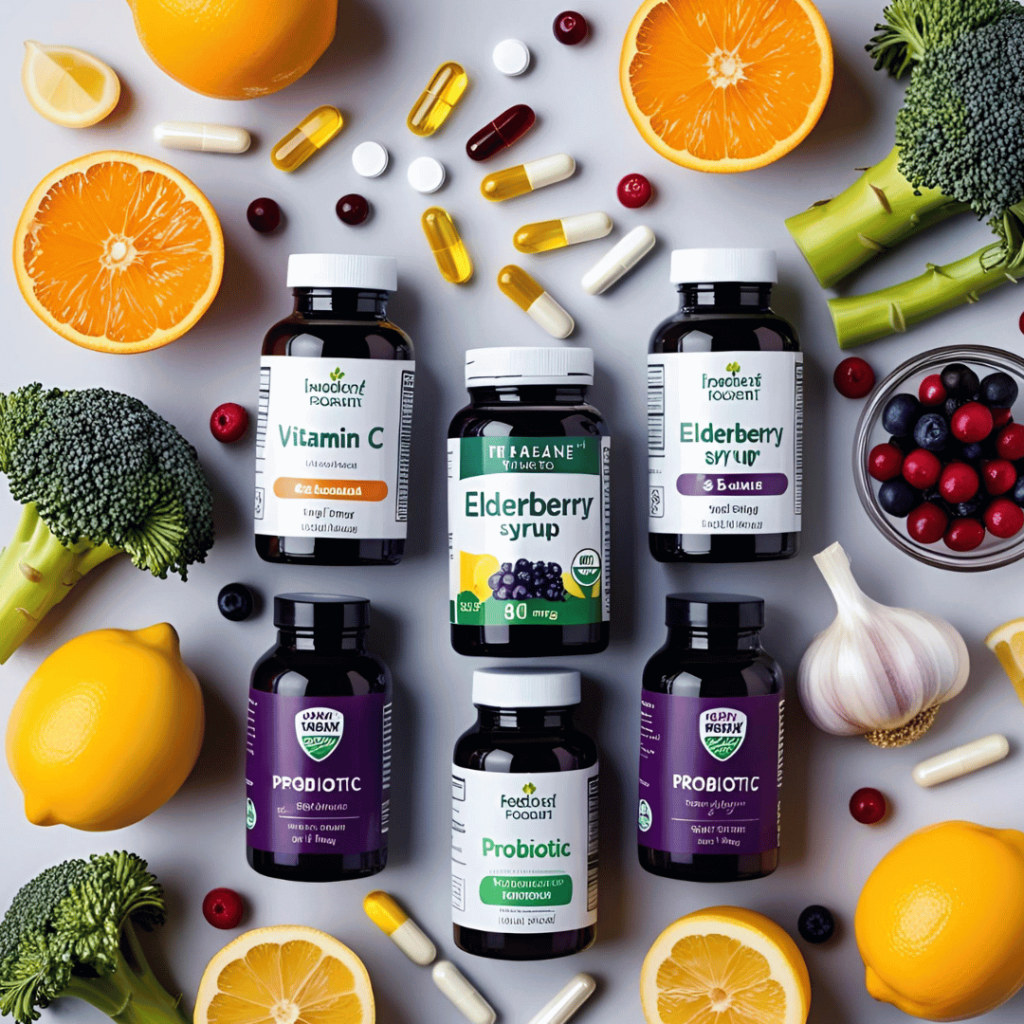As we navigate 2025, maintaining a strong immune system remains a top priority, especially during seasonal changes when colds, flu, and other infections are more prevalent. The demand for immune-boosting supplements has surged as people seek natural and effective ways to enhance their body’s defenses. From vitamins and minerals to herbal remedies, these supplements play a crucial role in supporting overall health and resilience.
This article explores the most effective immune-boosting supplements for seasonal wellness in 2025, backed by research and practical insights.

Why Immune Health Matters Year-Round
A robust immune system is essential for protecting the body against pathogens like bacteria, viruses, and fungi. Seasonal changes can weaken immunity due to fluctuating temperatures, increased exposure to germs, and lifestyle factors like stress or poor sleep. Immune-boosting supplements provide targeted support to strengthen the body’s natural defenses, reduce the risk of infections, and promote faster recovery.
Top Immune-Boosting Supplements in 2025
1. Vitamin C
Vitamin C is a powerful antioxidant that supports various immune functions:
- Enhances the production of white blood cells.
- Protects cells from oxidative damage caused by free radicals.
- Reduces the duration and severity of colds.
Sources: Citrus fruits (oranges, grapefruits), broccoli, bell peppers.
Supplement Dose: 500–1,000 mg daily.
2. Vitamin D
Known as the “sunshine vitamin,” vitamin D plays a crucial role in modulating immune responses:
- Supports T-cell activation to fight infections.
- Reduces inflammation associated with respiratory illnesses.
- Helps prevent seasonal illnesses like colds and flu.
Sources: Sunlight exposure, fortified dairy products, fatty fish.
Supplement Dose: 1,000–4,000 IU daily.
3. Zinc
Zinc is essential for immune cell function and wound healing:
- Boosts the activity of natural killer cells.
- Shortens the duration of colds when taken at the onset of symptoms.
- Regulates inflammatory responses.
Sources: Shellfish, nuts, seeds.
Supplement Dose: 15–30 mg daily.
4. Elderberry
Elderberry extract is rich in antioxidants and has antiviral properties:
- Reduces the severity and duration of flu symptoms.
- Enhances cytokine production to support immune defense.
- Provides relief from upper respiratory infections.
Sources: Sambucus nigra (elderberry fruit).
Supplement Dose: 300–600 mg daily.
5. Ashwagandha
This adaptogenic herb supports overall immune health by reducing stress:
- Modulates cytokine levels to balance immune responses.
- Promotes healthy antibody production.
- Reduces cortisol levels, which can suppress immunity under stress.
Sources: Withania somnifera root extract.
Supplement Dose: 300–600 mg daily.
6. Probiotics
Probiotics maintain gut health, which is closely linked to immunity:
- Increase beneficial gut bacteria that regulate immune responses.
- Reduce inflammation and improve nutrient absorption.
- Help prevent respiratory infections.
Sources: Yogurt, kefir, fermented foods like sauerkraut.
Supplement Dose: 10–20 billion CFUs daily.
7. Echinacea
Echinacea is a herbal remedy known for its immune-stimulating properties:
- Activates white blood cells to fight infections.
- Reduces the risk of catching colds during seasonal changes.
- Provides mild anti-inflammatory effects.
Sources: Echinacea purpurea plant extract.
Supplement Dose: 300–500 mg daily.
Table: Comparing Top Immune Boosters
| Supplement | Key Benefits | Recommended Dose | Natural Sources |
|---|---|---|---|
| Vitamin C | Antioxidant; reduces cold duration | 500–1,000 mg daily | Citrus fruits, broccoli |
| Vitamin D | Modulates immunity; prevents respiratory issues | 1,000–4,000 IU daily | Sunlight, fatty fish |
| Zinc | Enhances immune cell function; shortens colds | 15–30 mg daily | Shellfish, nuts |
| Elderberry | Antiviral; reduces flu severity | 300–600 mg daily | Sambucus nigra fruit |
| Ashwagandha | Reduces stress; balances cytokines | 300–600 mg daily | Withania somnifera root |
| Probiotics | Improves gut health; regulates immunity | 10–20 billion CFUs daily | Yogurt, fermented foods |
| Echinacea | Activates white blood cells; fights infections | 300–500 mg daily | Echinacea purpurea plant |
How to Choose the Right Immune Supplement
When selecting an immune supplement in 2025:
- Look for evidence-based ingredients like vitamin C, D, zinc, or elderberry.
- Opt for high-quality brands with third-party testing for purity and potency.
- Consider personalized supplements tailored to your unique health needs using DNA or microbiome testing technologies.
- Consult with a healthcare professional before starting any new supplement regimen.
Lifestyle Tips for Enhanced Immunity
While supplements are beneficial, they work best when combined with healthy lifestyle habits:
- Eat a balanced diet rich in fruits, vegetables, lean proteins, and whole grains.
- Stay hydrated by drinking plenty of water throughout the day.
- Exercise regularly to improve circulation and boost immunity.
- Prioritize sleep to allow your body to recover and regenerate.
- Manage stress through mindfulness practices like meditation or yoga.
Conclusion
In 2025, immune health continues to be a cornerstone of wellness as people seek proactive ways to stay healthy during seasonal shifts. Immune-boosting supplements like vitamin C, vitamin D, zinc, elderberry, ashwagandha, probiotics, and echinacea offer powerful support for strengthening the body’s defenses against infections and promoting overall well-being.
By incorporating these supplements into your routine alongside a healthy lifestyle, you can build resilience against seasonal illnesses and enjoy better health year-round.
Research References
- Vitaquest (2025). https://vitaquest.com/fall-supplement-trends-2025/
- Holland & Barrett (2025). https://www.hollandandbarrett.com/shop/vitamins-supplements/condition/cold-immune-support/
- Healthline (2025). https://www.healthline.com/nutrition/immune-boosting-supplements
- NIH Office of Dietary Supplements (2025). https://ods.od.nih.gov/factsheets/ImmuneFunction-HealthProfessional/
- Vitabiotics (2025). https://www.vitabiotics.com/collections/immune-system-supplements
- Frontiers in Immunology (2023). https://www.frontiersin.org/journals/immunology/articles/10.3389/fimmu.2023.1186635/full
- PubMed Central (2017). https://pmc.ncbi.nlm.nih.gov/articles/PMC5707683/
- Consensus Blog (2025). https://consensus.app/home/blog/health-benefits-of-elderberry-syrup/
- Ohio State University Medicine (2025). https://medicine.osu.edu/news/vitamin-c-promotes-immune-cell-differentiation
- PubMed Central (1998). https://pubmed.ncbi.nlm.nih.gov/9701160/
Dr. Ryan Cooper is a physician affiliated with Duke University and Duke University Health System. He specializes in internal medicine and serves as an intern within the Department of Medicine. His education includes medical training at Drexel University College of Medicine, followed by residency at Penn State Hershey Medical Center. Dr. Cooper is board-certified by the American Board of Internal Medicine and is a member of professional organizations such as the American College of Physicians and the Society of Hospital Medicine. His research includes publications on acute kidney injury and renal oxalosis, emphasizing his expertise in internal medicine and nephrology.

